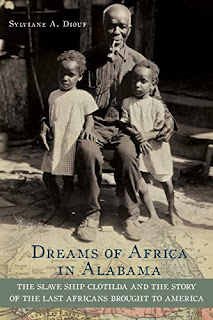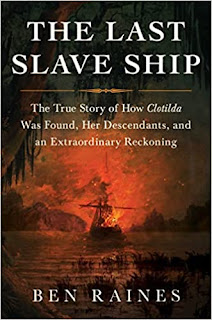 |
| The wreck recovered, May 22, 2019. It was "remarkably in tact," according to an NPR story. |
"One hundred and fifty-nine years ago, slave traders stole Lorna Gale Woods' great-great grandfather from what is now Benin in West Africa. Her ancestor, Charlie (Cudjo) Lewis [born Oluala Kossolo] was brutally ripped from his homeland, along with 109 other Africans, and brought to Alabama on the Clotilda, the last known slave ship to arrive in the United States. Today, [May 22, 2019] researchers confirmed that the remains of that vessel, long rumored to exist but elusive for decades, have been found..." The Smithsonian Institution, a major partner in the ship's recovery and authentication.
According to an excellent article in Wikipedia, a spokesperson for the community said Cudjo (pictured left) died in 1935. Redoshi, another captive on the Clotilda, was sold to a planter in Dallas County, Alabama, where she became known as Sally Smith. She married, had a daughter and lived to 1937. Another survivor, Matilda McClear, lived until 1940. By then there were eight surviving members of the last slave ship from Africa. (Wikipedia, note 2 below, and the book Dreams of Africa in America by Sylviane Anne Diouf, Oxford U Press, 2007..
An interesting note on the authentication of the slave trade and its monstrous trafficking in human lives is that the anthropologist and writer Zora Neale Huston made her own significant discovery in about 1925: She found Cudjo and interviewed him about his experiences. Unfortunately, she had trouble finding a publisher for this story, even after publication of her novel Their Eyes Were Watching God. The interviews were finally published in 2018 in Hurston's book titled Barracoon: The Story of the Last "Black Cargo." I just discovered that Hurston's title was the name of the prison and holding pen where the slaves were kept before their forced trip to America. The content and the significance of Hurston's interviews, lost for decades, were revived again after the Clotilda's resurrection from the dead.
Soon scheduled for release, on January 25, the investigative journalist Ben Raines, who worked for years on recovering the Clotilda, will tell his story in The True Story of How Clotilda was Found, Her Descendants, and an Extraordinary Reckoning. For some time, it appears, the major institutional partners in the project, the Alabama Historical Society, the National Geographic, SEARCH Inc, the Smithsonian, and others, neglected to mention the work Ben Raines with the support of the University of Southern Mississippi researchers had done in making this discovery possible. It was trial and error for a long time, but Raines persevered and he deserves recognition for his obsessive work in pinning down the Clotilda's location. I'm glad he's telling his story, and I look forward to reading this book."Either the United States will destroy ignorance or ignorance will destroy the United States." W.E.B. Dubois (1868-1963)
2. https://www.npr.org/2021/12/22/1067078342/wreckage-of-last-slave-ship-clotilda-alabama
3. https://www.abebooks.com/Dreams-Africa-Alabama-Slave-Ship-Clotilda/31057664499/bd?cm_mmc=ggl-_-US_Shopp_Textbook-_- The story of the last Africans forced and trafficked to the US, based on their own stories, memories of Africa, and the tragic experience of being captured and enslaved in the U.S. in 1860, just 1 year before the outbreak of Civil War.
7. https://www.history.com/news/zora-neale-hurston-barracoon-slave-clotilda-survivor Hurston's unpublished manuscript of Barracoon is held by the Spingarn Center at Howard University. The importance of preserving historical documents revealed!
8. https://www.history.com/news/us-illegal-slave-trade-civil-
9. https://www.al.com/news/mobile/2019/05/reporter-raines-credited-for-role-in-clotilda-search.html.
10. https://www.hup.harvard.edu/catalog.php?isbn=9780674330511, W.E.B.DuBois's Suppression of the Slave Trade to the USA, 1638-1870, his pioneering research and dissertation at Harvard, where he was the first African-American to receive a PhD. The slave trade actually continued after it was legally prohibited, but DuBois's study and his subsequent research and writing remain an important contribution to the extensive scholarship on slavery and the African-American experience. See also https://www.jstor.org/stable/2294050 The writings of DuBois are best of all, starting with The Souls of Black Folks.








No comments:
Post a Comment